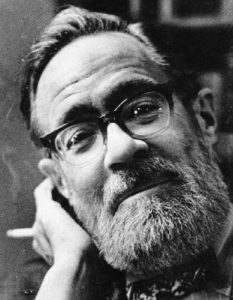 John Berryman, famous for The Dream Songs, is a poet who is very non-traditional in his form. He “takes liberties with syntax and style”. The Dream Songs involves a syntax which Berryman partially adopted from Shakespeare who was a big influence in his work. Some other major influences in his life were Robert Lowell, Mark Van Doren, and Yeats. In The Dream Songs, Berryman speaks about his own life through a man named Henry. Henry is a middle-aged American who must deal with paternal suicide, drunkenness, and other problems that Berryman himself experienced. He speaks to an unnamed friend about his issues, and his friend sometimes offers advice. There are almost 400 Dream Songs which were originally published in 77 Dream Songs and His Toy, His Dream, His Rest. When they became a big hit, they were published together in The Dream Songs.
John Berryman, famous for The Dream Songs, is a poet who is very non-traditional in his form. He “takes liberties with syntax and style”. The Dream Songs involves a syntax which Berryman partially adopted from Shakespeare who was a big influence in his work. Some other major influences in his life were Robert Lowell, Mark Van Doren, and Yeats. In The Dream Songs, Berryman speaks about his own life through a man named Henry. Henry is a middle-aged American who must deal with paternal suicide, drunkenness, and other problems that Berryman himself experienced. He speaks to an unnamed friend about his issues, and his friend sometimes offers advice. There are almost 400 Dream Songs which were originally published in 77 Dream Songs and His Toy, His Dream, His Rest. When they became a big hit, they were published together in The Dream Songs.
John Allyn Smith was born in MacAlester, Oklahoma on Oct. 25, 1914. He lived on the family farm and later moved to Florida in 1926. That same year his father, depressed over business issues and marriage trouble, committed suicide right outside his son’s window. This event wounded Berryman for the rest of his life. When the mother married a man named John Berryman, she changed her son’s last name to Berryman. Berryman was not quickly accepted into South Kent School in Florida and was constantly teased. One day, after he had just gotten beat up, he attempted to commit suicide by throwing himself onto train tracks as a train was approaching. Boys from his school quickly pulled him off the tracks, and he escaped unharmed. Even though he was not socially adept, he excelled in academics. He became the first boy in South Kent to graduate one year early. Berryman got his undergraduate degree from Columbia College in 1936 where he published poems in their literary magazine. He then attended Cambridge University on fellowship. He taught at Wayne State University, Harvard, Princeton, University of Iowa, and University of Minnesota. He would remain at Minnesota until his death. Berryman married three times. His wives were Eileen Simpson (1942), Ann Levine (1956), and Kathleen Donohue (1960). Berryman died on Jan 7, 1972 when he threw himself off a bridge in Minneapolis onto some frozen rocks in the Mississippi River leaving behind his wife, two young daughters, and his son.
Berryman often wrote about how he felt about his father’s death in his poetry. Berryman was also dependent on alcohol for thirty years and was treated several times, drifting in and out of rehabilitation and psychoanalysis. His addiction was another issue that had a large impact in his poetry. Berryman’s distinctive way of telling about his life through poetry was loved by many. He won eleven awards: Oldham Shakespeare Prize, Poetry Society of America’s Shelley Memorial award (1948), American Academy award for poetry (1950), National Institute of Arts and Letters Award (1950), the Levinson Prize (1950), the Guggenheim Fellowship (1952, 1966), Academy of American Poets, The Pulitzer Prize(1964), National Endowment for the Arts award (1967), National Book Award (1969), and the Bollingen Award (1969).
